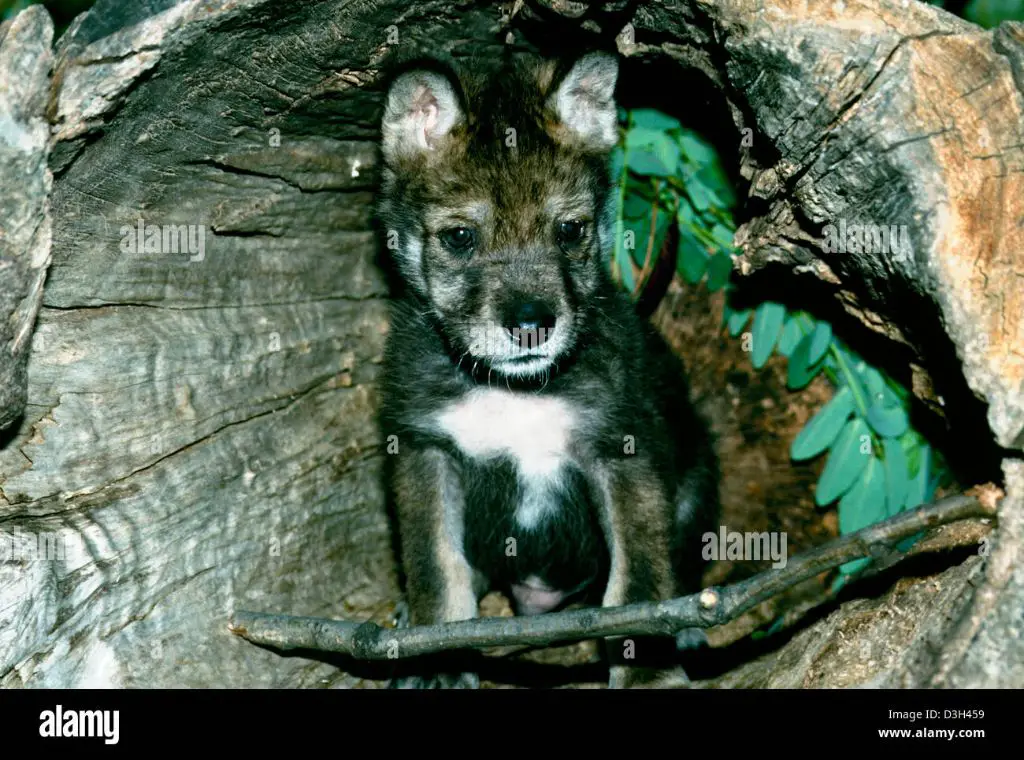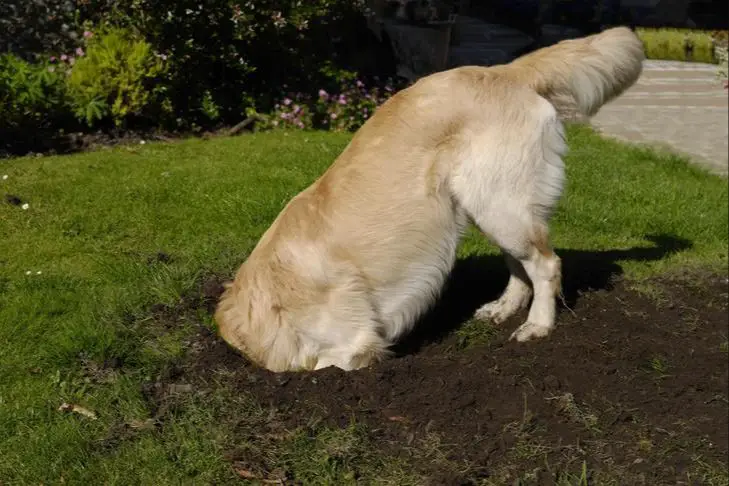Introduction
Dogs are descended from wolves and share many behavioral traits as a result of this ancestry. One such inherited behavior is the instinct to seek shelter in dens, likely passed down from wolves that dug underground dens to birth and raise their pups. This denning instinct remains strong in many modern dog breeds, leading them to dig holes or seek out small enclosed spaces as sheltered resting areas. While not all dogs demonstrate denning behavior, it is an innate drive connected to their wild origins.
Wolf Ancestry
Dogs descended from wolves and share many similar traits and behaviors as their ancestor. Genetic studies show that dogs are closely related to modern gray wolves (How Wolf Became Dog). Dogs share over 99% of their DNA with wolves and it’s estimated that dogs split from wolves around 15,000 years ago. After hundreds of years of domestication, dogs began to exhibit physical and behavioral differences from wolves but that common wolf ancestry is still apparent.
One of the key behaviors dogs inherited from their wolf ancestors is living in dens. Wolves often dig out dens or burrows to raise their young and take shelter from cold weather (Library: Evolution of the Dog). These dens provided protection and a safe place for wolf pups to grow. The denning instinct remains strong in many dogs today.
Benefits of Dens
Wolves make use of dens for protection from the weather and to provide a safe space for raising pups. Dens help shield wolf packs from the elements like rain, snow, wind, and extreme temperatures. They dig dens into well-drained soil, often on south-facing slopes that receive more sunlight and warmth. According to Wolf Country, dens may be dug under boulders, among tree roots, or into hillsides for stability and drainage http://www.wolfcountry.net/information/WolfDen.html.
However, the main purpose of dens is for giving birth and rearing pups during their first weeks. Pregnant female wolves need a sheltered, warm spot to deliver their litters. Wolf pups are blind at birth and very vulnerable, so the den provides a secure environment. As noted by Western Wildlife, females will move the pups among multiple den sites to avoid predators. Dens allow pups to grow and thrive during this early developmental stage before joining the pack https://westernwildlife.org/gray-wolf-canis-lupus/biology-behavior-4/.
Modern Dog Behavior

Some dogs still exhibit a strong instinct for denning despite being domesticated household pets.1 Certain breeds are more prone to digging and burrowing, indicating they retain more of the denning behaviors of their wild ancestors. Breeds like Dachshunds, Terriers, and Beagles frequently engage in digging due to their history as hunting and burrowing dogs.2
The strongest digging instincts are found in small breeds that were originally bred to flush out prey from burrows. For example, the long, lean body of a Dachshund allowed it to easily enter and navigate underground tunnel systems when chasing badgers or other burrowing animals.3 Today, Dachshunds often “den” under blankets or dig burrows in the backyard as an inherited trait from their distant wild ancestors.
Providing a Den
Dog crates can substitute for dens and provide a safe enclosed space that allows dogs to retreat when they feel the need. Quality plastic, wire, or soft-sided crates give dogs their own territory and satisfy their instinct to den. Look for crates with a den-like design, with a roof and three closed sides to create a more enclosed, cozy feel. Some specific models built with denning in mind include the ZenCrate and Bowhaus Crate.
Enclosed dog beds can also satisfy a dog’s desire to den. Raised beds with roofs and low entryways mimic a den while keeping dogs comfortable and secure. Orvis makes high-quality enclosed beds ideal for denning dogs.
When shopping for a crate or enclosed bed for denning purposes, prioritize models marketed as calming retreats. Avoid crates and beds with transparent panels and open designs. Dogs feel most secure when they can burrow out of sight. Focus on creating a darkened, snug space to strengthen your dog’s denning instincts.
Signs of Denning Instinct
There are some clear signs that demonstrate your dog’s natural denning instincts.
Perhaps the most obvious sign is digging behavior. Dogs may dig at their beds, furniture, or floors in an attempt to create a comfortable, protected space. According to the article “Why Every Dog Needs a Den” on zendogcrate.com, when dogs dig up the yard or hide under tables, it’s due to their natural denning instincts.
Dogs will also seek out small, enclosed spaces to relax in, such as under tables, in closets, or in covered crates. As stated in the LiveJournal article “What Is Denning Instinct In Dogs?”, dogs instinctively prefer to seek shelter and comfort in a crate or den. This hiding behavior in tight spots is a survival instinct passed down from wolf ancestors.
Downsides of Denning

While denning behavior is natural for dogs, it can sometimes become problematic. Two main downsides of denning behavior are destructive digging and separation anxiety.
Some dogs engage in destructive digging when their denning instincts kick in. They may dig up carpets, furniture, or even outdoor landscapes in an attempt to create a den. This destructive behavior can damage property and be a nuisance for owners. Proper training and providing acceptable outlets for digging can help curb this issue. As one article explains, “In some cases, dog dens do cause distress. However, this is almost always due to improper crate training. When a dog is punished with crate time…” (Source)
Dogs with separation anxiety may also turn to destructive den digging when left alone as a way to self-soothe and feel safe. However, a recent article argues that forced confinement can actually worsen separation anxiety for some dogs: “A large majority of dogs with separation related issues also experience confinement distress, which may make matters worse.” (Source) If separation anxiety is the cause, owners will need to address the underlying issue through training.
Alternatives to Dens
While some dogs have a strong natural instinct to dig dens, this behavior can be redirected in modern domestic dogs. Providing adequate mental stimulation and meeting your dog’s exercise needs are effective alternatives to letting them dig up your yard.
Mental exercise is just as important as physical exercise for dogs. Simple games like hide and seek with treats or food puzzle toys can fulfill your dog’s needs to use their nose and hunt for rewards. Rotating different puzzle toys keeps things interesting and prevents boredom. Teaching new tricks and commands also provides mental stimulation. A tired brain is less likely to engage in undesirable behaviors like excessive digging.
Make sure your dog gets enough physical activity every day. Long walks, playing fetch, swimming, or taking them to a dog park allows them to run around and burn energy. Different breeds have different exercise requirements, so understand your dog’s needs. High-energy dogs like Labradors may need over an hour of activity per day. Providing an outlet for their energy reduces the urge to dig holes out of boredom.
Lastly, consider providing a sanctioned digging area in your yard where your dog is allowed to dig. Having an acceptable outlet for the behavior can satisfy their natural instincts. Supervise your dog in the designated digging zone and reward them for using it.
When to Seek Help

In some cases, a dog’s denning behavior can become problematic and warrant seeking professional help. Signs that your dog’s denning or digging habits need intervention include:
- Excessive anxiety – If your dog is digging and denning constantly due to severe anxiety or stress, this signals an underlying issue that needs to be addressed. Persistent digging can be a sign of separation anxiety, fear, or compulsive disorders that require treatment.
- Damage to property – If your dog’s digging is destructive and ruins furniture, carpets, drywall, etc., it has gone beyond normal denning instinct. Destructive digging may stem from boredom, lack of exercise, or anxiety. Consulting with a trainer or behaviorist can help curb this behavior.
A professional dog trainer or veterinary behaviorist can assess the cause of unhealthy digging habits and provide customized treatment plans. This may involve conditioning exercises, anxiety medication, addressing compulsive tendencies, and implementing environmental enrichment. Stopping destructive digging relies on addressing the root cause rather than just punishing the behavior itself.
Conclusion

In summary, domestic dogs retain some wolf-like denning behaviors from their ancestors. While not all dogs actively seek out dens, many enjoy small enclosed spaces that allow them to feel safe and secure. Denning satisfies natural canine instincts to find shelter and have their own space. Dog owners can often observe denning behavior in the homes of their pets, who may hide under furniture, burrow into blankets, or retreat to closets or other cozy areas. Recognizing and providing appropriate denning opportunities can greatly benefit a dog’s health and happiness.